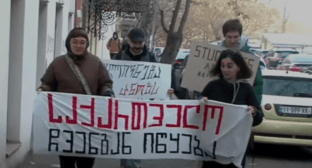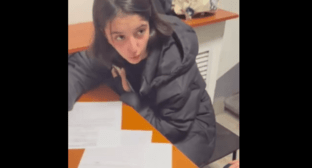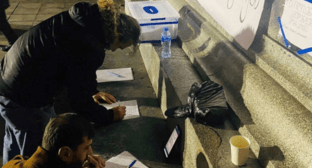27 May 2004, 17:54
Trumped-up case press conference
Organized by the Russian nationwide Movement for Human Rights, a press conference titled "Mikhail Trepashkin: a sentence with special cynicism" was held at the Independent press center in Moscow, Russia, on Monday, May 24.
Mikhail Trepashkin, a former Federal Security Service (FSB) officer who is now a lawyer, was on May 19 sentenced to 4.6 years in a settlement. The time is counted from December 1, 2003, i.e. from the moment he was taken into custody. The case was heard by the Moscow district military court.
Two actions were brought against Trepashkin: one on a charge of divulgence of a state secret and illegal storage of ammunition and another on a charge of illegal storage of arms (which is yet to be heard). In both cases, the charges were trumped up. The real aim was to suspend Mikhail Trepashkin from participation in the case of explosions on Gurianov St. in 1999 in which he acted as a lawyer on behalf of the victims. Amnesty International recognized Trepashkin as a political prisoner.
The following people came to the Independent press center to meet the press: lawyers Elena Liptser, Valerii Glushenkov and Nikolai Gorokhov, Mikhail Trepashkin's wife Tatiana and Lev Ponomariov, chief executive of the Russian nationwide public movement For Human Rights. The press conference did not draw considerable attention from the media, so it was more like a private conversation. The interlocutors commented on the process and the sentence and said what steps they were going to take next.
Lev Ponomariov: It was not by chance that Mikhail Trepashkin got behind bars. He challenged the system of authoritarian rule and the police regime established in Russia. He is a dissident inside the FSB. He cooperated with the public commission on the explosions chaired by Sergei Kovaliov and Sergei Yushenkov. And he found evidence that the FSB might have been involved in those explosions. As a lawyer, he began to express these ideas at the process, which cost him freedom. By the way, already behind bars, he dared to write a letter to the Prosecutor General's Office in which he demanded that legal action should be taken against Patrushev. Meanwhile, people are afraid to bring such charges even when they are not in prison. Everything Trepashkin is charged with is the security service's revenge and its wish to get a person threatening the system out of the way.
Question: What can you say about the sentence?
Elena Liptser: I think the sentence very cynical. By ruling that Mikhail Ivanovich Trepashkin must serve his time in a settlement, the court admitted that he is not dangerous to society. However, they thought impossible to give him a suspended sentence, although the court had every reason to do so. In my entire practice I have never seen a real sentence given for storing cartridges to a person who goes on trial for the first time, has registration in Moscow, a family and positive references. Two out of the four years and a half of his time were given to Mikhail Ivanovich for storing cartridges. I can only explain this with fear that the other case which has presently been sent for trial will collapse.
Question: What was Mikhail Trepashkin's reaction to the outcome of the trial?
Valerii Glushenkov: Most likely, he had expected something of the kind. We know that he had had a talk with an investigation officer at the detention center awhile before the sentence was pronounced. The officer had told him frankly that appealing would be in vain, because everything had been decided by that time: four years in a settlement. In my opinion, this is a direct indication that the case was tailored. By the way, we are going to appeal against the sentence pronounced by the Moscow district court in a day or two and we will also appeal to the Supreme Court's military panel. We will appeal against it both under Article 222 (illegal storage, carrying and transportation of firearms and ammunition) and Article 283 (divulgence of a state secret).
Question: To the best of my knowledge, you have addressed the European Court of Human Rights. How did it get on there?
Elena Liptser: Yes, we addressed the European Court on November 19, 2003, with a complaint about some articles of the European Convention violated, in particular the article about the right to security of person. There were a lot of violations, actually. Firstly, the Criminal-Procedural Code was violated when Mikhail Ivanovich was taken into custody, because there is a special procedure to take legal action against a lawyer. Secondly, he was kept in inhuman conditions in the Matrosskaia Tishina prison. It went as far as simply preventing him from having enough sleep and taking a shower during a month. Thirdly, the very measure of restraint in the form of detention was assigned round the legal procedure. By the way, I believe Mikhail Ivanovich continues to be illegally kept in custody. So I wrote about all this in the European Court of Human Rights. I also lodged a complaint with the European Committee against Torture about the awful conditions under which convicts are convoyed. The committee is now preparing to file an address to Russia concerning that matter. Meanwhile, the European Court will hear Trepashkin's case as a priority. This is the first time such a decision is made with regard to Russian cases.
Question: What are the criteria for the court to hear a case as a priority and what advantages does that give?
Lev Ponomariov: As a matter of fact, such decisions are made only in rare cases and this requires some special reasons. I believe the crucial point here was that the case was artificial and violated not only Russian legislation but also the Convention on Human Rights. First and foremost this goes for the detention conditions which I cannot describe in a way other than degrading. After all, we know that Mikhail Trepashkin was deliberately put into a foul, unfit room sized two square meters.
Elena Liptser: First, this saves a lot of time. Inquiries have been made presently to the Russian government, and there are responses to them already, a so-called memorandum of the Russian Federation that has been submitted to the European Court and then forwarded for Mikhail Ivanovich and me to draw up objections. We must submit them until June 9, and our complaint will then be appointed for consideration.
Question: What are your forecasts concerning the outcome of the second case?
Valerii Glushenkov: Well, basically, we can count on a positive outcome. Aside from anything else, we have one very important trump card. The matter is the following became known about the origin of the gun planted on Trepashkin. A federal service man had lost it in Grozny, Chechnya, after which Mikhail Ivanovich came to possess it, according to the official version. However, we have evidence that the gun had not been lost, but seized by special services. And we will insist on interrogating the former owner of the gun, maybe even by Grozny's judiciary. The case can only be closed when this whole story is cleared up. There can be various assumptions. Nothing can be said accurately as yet. However, I will not be surprised if it didn't get by without the "assistance" of FSB officer Shebalin here who had a lot of reasons to get even with Trepashkin. Shebalin is known to have visited Chechnya many times, so he could offer his services himself.
Editors note: See also the article "Press conference, devoted to Mikhail Trepashkin's sentence, to be held in Moscow".
Author: Ksenia Ladygina, CK correspondent Source: Caucasian Knot




